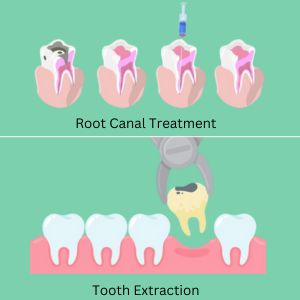What is Root Canal Treatment?
Root Canal Treatment is a procedure that addresses infections or damage within the pulp of a tooth. The pulp contains nerves and blood vessels, and when it becomes infected due to deep decay, trauma, or repeated dental procedures, it can lead to severe pain. During the treatment:
- The infected pulp is removed.
- The canals are cleaned and disinfected.
- The tooth is sealed and restored, often with a crown, to restore its strength and functionality.
Root canal treatment allows you to save your natural tooth, which is important for maintaining your bite, appearance, and oral function.
Benefits of Root Canal Treatment:
- Preserves Your Natural Tooth: A root canal allows you to keep your tooth, which helps maintain proper alignment and function of your bite.
- Pain Relief: It eliminates the infection and alleviates the pain caused by an inflamed or infected pulp.
- Prevents Further Damage: Treating the infection prevents the spread of bacteria to other parts of your mouth.
- Long-Term Solution: With proper care, a tooth that has had a root canal can last for many years or even a lifetime.
What is Tooth Extraction?
Tooth Extraction involves the removal of a tooth from its socket. It is generally recommended when a tooth is too damaged or infected to be repaired, and when a root canal is no longer a viable option. After extraction, the missing tooth may need to be replaced with an implant, bridge, or denture to restore your smile and function.
While extraction can solve an immediate problem, it comes with long-term consequences, such as:
- Loss of tooth structure and function
- Potential shifting of surrounding teeth
- Aesthetic concerns
Benefits of Tooth Extraction:
- Immediate Relief: Extraction provides instant relief from pain caused by an infected tooth.
- Suitable for Severe Cases: When a tooth is too decayed, cracked, or infected, extraction may be the only viable option.
- Simpler Procedure: In some cases, extraction may be a quicker solution compared to a root canal treatment.
Root Canal Treatment vs. Tooth Extraction: Which is Better?
1. Preservation of Natural Tooth
- Root Canal Treatment: The primary benefit of root canal treatment is that it saves your natural tooth. A root canal allows you to keep your tooth, maintaining the natural alignment and structure of your bite.
- Tooth Extraction: Extracting a tooth means you lose it entirely. While replacement options are available, they require additional procedures and might not be as durable or functional as your original tooth.
2. Pain Relief
- Root Canal Treatment: Contrary to popular belief, root canal treatment is typically not painful. The procedure eliminates the infection, providing significant relief from severe tooth pain.
- Tooth Extraction: Extraction is typically done under anesthesia, so the procedure itself is painless. However, the recovery period can be uncomfortable, and you might experience swelling and soreness afterward.
3. Long-Term Results
- Root Canal Treatment: A well-done root canal can last many years, often for a lifetime, especially when followed by proper dental care and the placement of a crown.
- Tooth Extraction: After extraction, you must consider long-term solutions such as dental implants, bridges, or dentures. These require ongoing care and can be costly over time.

4. Cost Considerations
- Root Canal Treatment: Root canal treatment may initially be more expensive than extraction, but it can be more cost-effective in the long term as it helps you avoid the need for further restorative treatments.
- Tooth Extraction: Although extraction may seem less expensive at first, the cost of replacing the extracted tooth (through implants, bridges, or dentures) can add up.
5. Risk of Infection
- Root Canal Treatment: When performed properly, a root canal eliminates the infection within the tooth and prevents it from spreading.
- Tooth Extraction: After extraction, there is a risk of infection at the extraction site, but with proper aftercare, the risk can be minimized.
6. Future Dental Issues
- Root Canal Treatment: Helps avoid complications like tooth shifting, bite problems, or jaw bone deterioration.
- Tooth Extraction: Can lead to shifting of adjacent teeth and jaw bone loss over time if not replaced promptly.
7. Ease of Procedure
- Root Canal Treatment: Requires skilled dental work, but the procedure is minimally invasive and effective at saving the tooth.
- Tooth Extraction: Typically a quicker process, but may require additional procedures (like implants) to restore function.
8. Duration of Procedure
- Root Canal Treatment: Typically takes 1-2 visits and around 60 to 90 minutes per session.
- Tooth Extraction: Usually completed in a single visit, often quicker but involves post-extraction care.
9. Complications
- Root Canal Treatment: Low risk of complications, but there is a small chance of reinfection or failure if not treated properly.
- Tooth Extraction: Risks include infection, bleeding, and the need for additional procedures like bone grafting if the space isn’t filled.
Why Choose Inspire Dental Clinic for Root Canal Treatment or Tooth Extraction?
We provide expert advice and treatment options tailored to your specific needs. We use state-of-the-art equipment to ensure both Root Canal Treatment in Gurgaon and tooth extractions are performed safely, comfortably, and with the best possible outcomes.
Conclusion
Deciding between Root Canal Treatment and Tooth Extraction depends on several factors, including the severity of the infection, your dental goals, and your budget. Root Canal Treatment is often the preferred option when the tooth can be saved, as it preserves your natural tooth and prevents future issues. However, Tooth Extraction may be the best choice for teeth that are too damaged or infected to be saved.
Consulting with a trusted dentist at Inspire Dental Clinic can help you make the right decision based on your specific case. Whether you need a Root Canal Treatment in Gurgaon or tooth extraction, we are here to guide you through the process with care and expertise.

